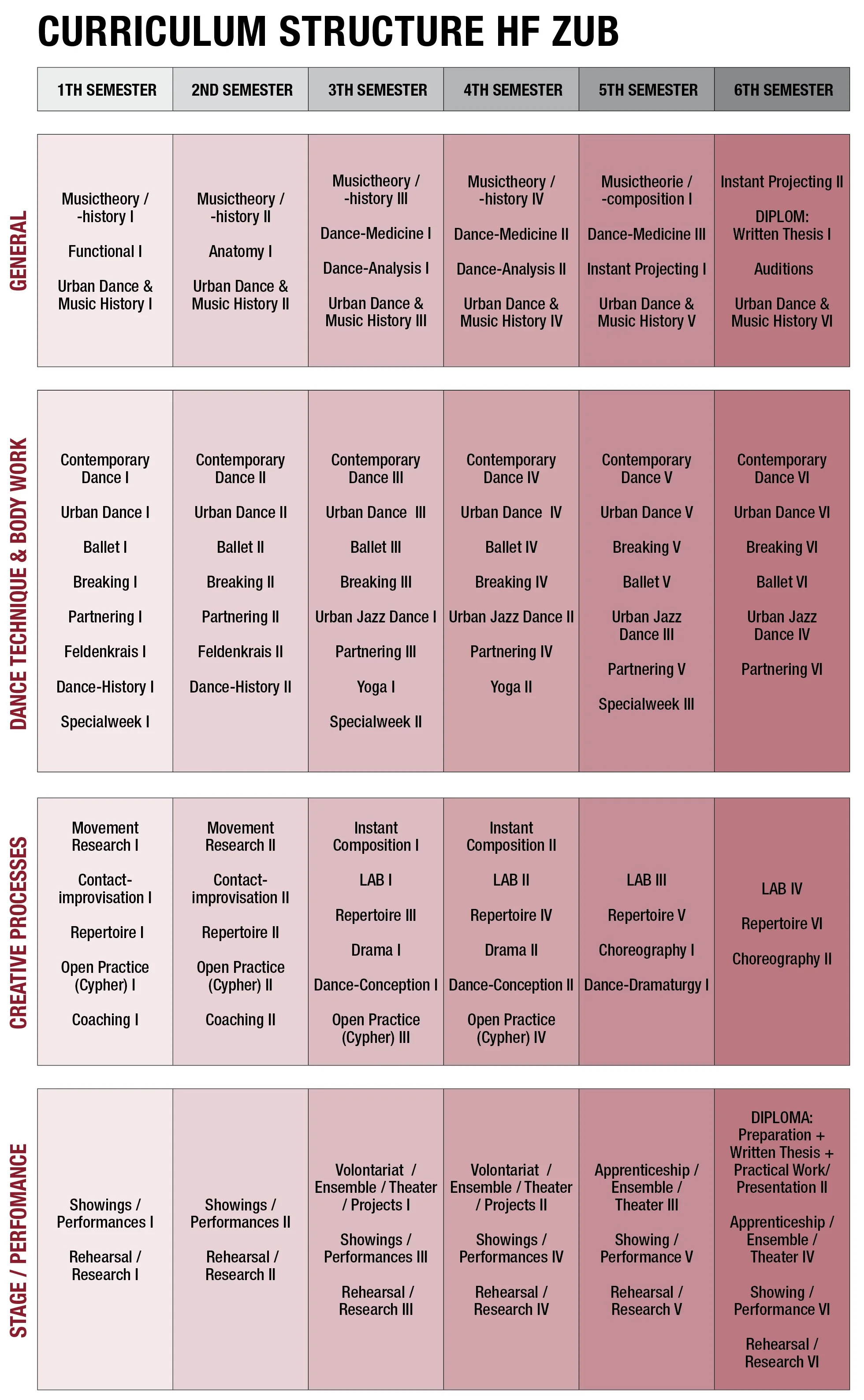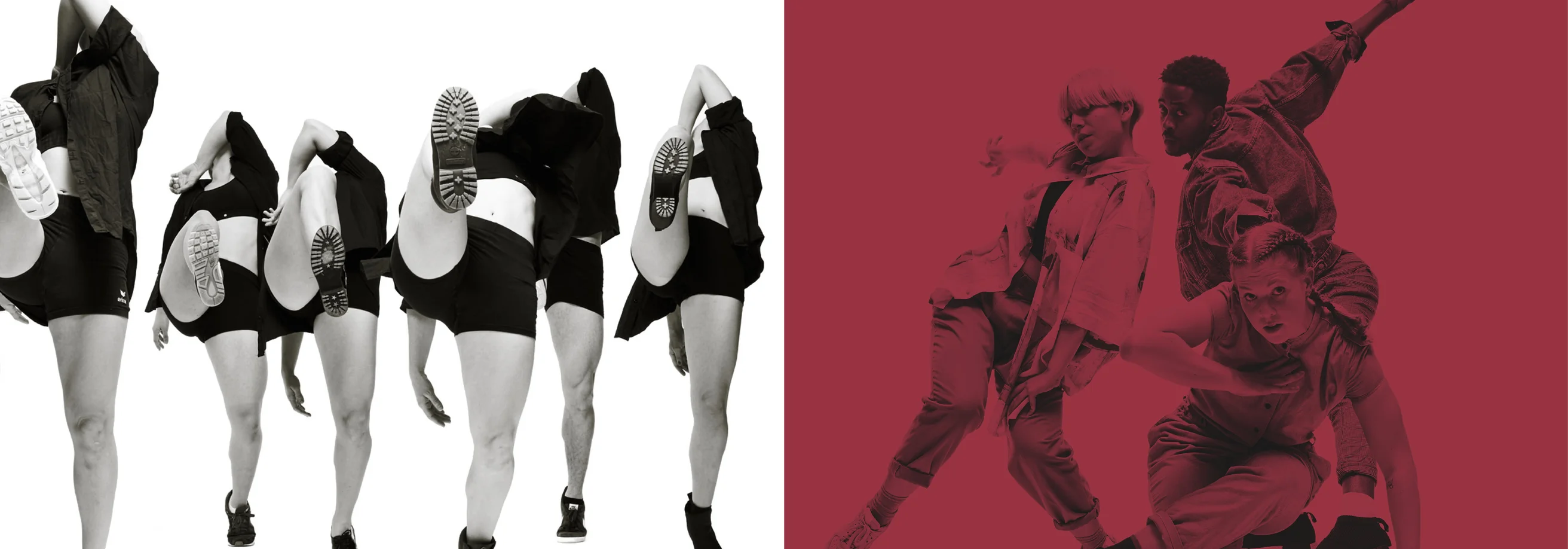Course of Studies HF ZUB
Duration
- 5400 hours of instruction (three years full-time): without swiss certificate of competence (EFZ)
- 3600 hours of instruction (two years full-time): with swiss certificate of competence (EFZ)
Choice of focus - either contemporary or classical dance
Study Programme
Matriculation always takes place in the winter semester to start in the following autumn semester. The schedule includes two units per day, one in the morning and another one in the afternoon, from Monday to Friday. In the first part of the day, the focus lies on the essential dance techniques and the development in contemporary and urban style. Additionally, there are regular lessons in the most important modern dance techniques, classical ballet, various jazz dance styles and supplementary but essential Bodywork classes such as Pilates, Feldenkrais, Yoga, Spiral Dynamics or Gyrotonic. During the Afternoon classes, the focus lies on creativity and innovation in the lessons of improvisation, partnering, repertory, choreography, research and rehearsals. Theoretical subjects take place during this time-frame as well. It is possible for exceptional workshops, rehearsals or projects to take place additionally at weekends or during isolated holiday weeks. Public holidays and holiday periods are consistent with the official holidays in canton Zurich.
There are showings, open lectures and performances held during each semester. This is an important component of the educational concept and supports the gain of experience and routine in front of an audience. An additional placement for at least one week per year in either different departments of a dance school, a professional dance training centre, a dance company or in a stage production will encourage the students to use the learned theory and dance techniques in practical experience. Also, it gives space to establish and evaluate the content of the studies and to build up and expand the network in the world of dance.
The goal in the third year is to master the dance techniques of contemporary and urban dance as well as having a basic knowledge of the techniques in modern, classical ballet and jazz dance, adding a succesful use of the lessons taught in bodyconditioning. The diploma project and exam will then additionally review the understanding and the knowledge on the creative process (choreography, concept, planning and realisation) of dance projects. The autonomous, self-reflecting way of working - not only interdisciplinary but also overarching theatre and other performing subjects - forms the foundation and essential characteristics of this graduate study course.
Module Table

Subjects
Practical core subjects 1:
Contemporary dance techniques (New Dance, Release, Floorwork)
Urban dance techniques (Hip Hop (Old and New School), House, Street)
Classical ballet
Improvisation / contact improvisation
Partnering
Practical core subjects 2:
Modern Dance (Limon/Humphrey, Graham, Cunningham based)
Jazz Dance (Traditional, Contemporay, Funky, Lyrical)
Breakdance
Practical subsidiary subjects:
Repertoire (Contemporary and Urban)
Choreography (Composition, scenic elements, Concept, Music)
Complementary techniques (Feldenkrais, Yoga, Pilates, Gyrotonic, Spiral Dynamic)
Music (Usage, Composition, Adaptation)
Stage play
Theoretical subjects 1 / General:
Dance history
Music history and theory
Dance medicine / Anatomy
Methodology (Contemporary and Urban dance)
English (Terminology, Analysis, Criticism)
Theoretical subjects 2 / Projects:
Choreography (Conception, Project management, Scenic elements)
Management (Documentation, Media, Terminology, Correspondence)
Copyrights (Choreography, Video, Audio, Literature, etc.)
Writing Skills
Addition:
Internships at dance schools, in professional dance ensembles or for stage dance/theatre projects.
Exams
PROBATIONARY PERIOD/ ADMISSION
The first eight weeks of the first semester are regarded as probationary period and finish with an aptitude test. The test is hold in the main subjects Contemporary, Urban, Ballet and Improvisation.
INTERMEDIATE EXAMINATION
The intermediate exams take place after every winter semester (1th/3th/5th). They are hold in every main subject as well as in theory and subsidiary subjects, which are completed after that semester. The examinations help the students and teachers to define the student's position and to give individual feedback and corrections as well as corrections involving group dynamics. The intermediate diploma exams take place, after the two summer semesters (2th and 4th). This is,
where the gained resources and competences get examined and evaluated appropriate to the curriculum. Possible public performances and projects are also integrated in the evaluation. The intermediate diploma exams in the theory subjects are held appropriate to the curriculum and appear with the last achieved grade in the diploma, if these subjects are only taught for a limited number of semesters. If a student doesn't pass the intermediate diploma qualification, he/she is allowed to repeat the semester and the examination if necessary.
DIPLOMA EXAMINATION AND DIPLOMA WORK
The final exam consists in an intern and an extern part. The intern part is a practical diploma exam, which shows off the resources and competences in all main subjects (Contemporary, Urban, Partnering and Improvisation). In addition, the student submits a written edition of it's diploma work, which has to be defended to a panel consisting school teachers, school direction as well as extern examiners.
The second part is the presentation of rehearsed and learnt choreographic repertoire works and the diploma work itself, which is carried out within the context of a public performance. So the diploma work consists of two parts: an independent choreographic work (group piece), which the student plans and realizes on its own and a theoretical and written work about the choreographic project, which the student has been working for over the 5th and 6th semester. The student establishes in this way the proof of its ability to transmit, to handle and to instruct artistic, practical and theoretical contents on it's own.
Recognition
The professional education HF Bühnentanz is a swiss certificated diploma, which therefore also gains international recognition.
German:
- dipl. Bühnentänzerin HF
- dipl. Bühnentänzer HF
French:
- Danseuse interprète diplômée ES
- Danseur interprète diplômé ES
Italian:
- Danzatrice dipl. SSS
- Danzatore dipl. SSS
The swiss legislation doesn't know national academic titles in English, we therefore recommend the following translation in English:
- Advanced Federal Diploma of Higher Education
The course of study is in the recognition process.
"I never imagined I would ever receive the opportunity to be admitted to a dance program which is welcoming such a variety of people with a different kind of background and approach. Personally, I came with a lack of foundation and anatomically speaking with no perfect precondition in the classical sense. I did the audition two years in a row until I passed. But the school supported me since the first audition and ever since. Whether it was concerning my development as a dancer, photographer, film maker or financial insecurities. HF Bühnentanz is a space for a big overview of the variety of dance, with well-known teachers and a network allowing the students to gain insight into the world of classical dance, contemporary dance and street styles. The school encourages to discover new ideas of movement without forgetting where it came from. I am very grateful that the school trusted me and I’m proud to have been part of this still quite new education program." Lena Marie Rheinländer, 2021
Fees
The annual fee for Swiss students is CHF 19'500.- annually. Swiss students from Switzerland receive financial contributions from their Canton in the amount of CHF 4'600.- per semester. Therefore the annual fee for Swiss students amounts to CHF 10'300.-, which can be paid in monthly rates.
The fee for international students is CHF 19'500.- annually.
Talented students who are in financial need for the study course, have the possibility to make an application for financial sponsorship from the the association Verein Freunde der Höheren Fachschule für Zeitgenössischen und Urbanen Bühnentanz.
Qualification of Scholarships at HF ZUB
Since March 2015, Swiss students of HF ZUB or those, who already worked two years in Switzerland, who fulfill the criteria for scholarships, can demand them at their canton. Scholarships can incur the education costs as well as the costs of living. The amount is calculated individually and depends of different factors like the parent's taxable income and fortunes.
Network
Thanks to their long lasting and regular work, the docents, guest docents and choreographers are all well connected with the national as well as international dance scene (freelanced and institutional work) and diverse dance educational programmes. The connection to many dance ensembles and their creative directors enables the direct insight in the artistic working processes. This consequently offers the future alumni a pulsating and versatile network and a fast entrance in the professional world.
Friends of HF ZUB
The association Verein Freunde der HF ZUB (Friends of HF ZUB) aims to fund talented and financially underprivileged students of stage dance without profit motive. This is made by financial payments or contributions in kind. The association is politically and confessionally independent.
- Talented students, which are not eligible for the canton's support, don't need to be refused because of their financial need.
- Students with financial need can put their focus on their studies and are not forced to stop their studies because of their financial need.
Patron
The non-profit organisation aims to support talented and financially underprivileged students in the field of stage dance. This is achieved through monetary and in-kind contributions. The association is politically and denominationally independent.
Objective
- Talented students who are not entitled to cantonal contributions or scholarships do not have to be turned away due to their financial need.
- Financially needy students can focus entirely on their education.
- Students do not have to discontinue their education due to financial need.
Interested patrons are welcome to receive further information. Please contact Isabel-Sophie Loheit at Mail.
MEMBERS OF THE ADVISORY BOARD
Dr. Susanne Herrnleben, Dr. Gerhard Brunner, Dr. Marco Wehr, Sven Weller
With their commitment, the members of the Advisory Board make an essential contribution to the international networking and credibility of the Friends of the College of Contemporary and Urban Stage Dance.
DR. SUSANNE HERRNLEBEN
2002 bis 2005 Universität Zürich: Mitgestaltung von bisher fünf Lehrgängen des Post Graduate-Weiterbildungsprogramms „Executive Master in Arts Administration“ (EMAA) in Zusammenarbeit mit Dr. Gerhard Brunner
2002 bis heute Agenturarbeit und Produktionsbetreuung von Regisseurinnen und Regisseuren
2010 Salle Modulable Luzern: Erstellung eines Betriebskonzepts für ein neues Mehrspartenhaus (Oper, Schauspiel, Ballett) im Auftrag der Stiftung Salle Modulable
2008 Akquise, Planung und Duchführung einer Japan Tournee mit AIDA in Zusammenarbeit mit Asahi Cultural Foundation und Osaka Festival
2001 – heute Geschäftsführerin und Gesellschafterin der Firma Brunner-Herrnleben Kunst- und Kulturproduktions- und Consulting GesmbH, Wien-Zürich
1991-2001 Vereinigte Bühnen Graz: Betriebsdirektorin/Produktionsleiterin des Opernhauses Graz
1990 Mitarbeiterin der Künstleragentur Dr. Raab und Dr. Böhm, Wien
1983-1990 Mitarbeiterin zweier Sonderforschungsbereiche, Assistentin am Institut für Geschichte der Universität Wien und Mitarbeiterin des Deutschen Historischen Instituts Rom
1988 Universität Wien: Promotion zum Doktor der Philosophie
1977-1983 Studium der Geschichte und Germanistik an den Universitäten Hannover, Tübingen und Wien
1997 – heute Ring Award: Mitarbeiterin im Organisationskomittee des Ring Award (Internationaler Regie- und Bühnenbildwettbwerb)
2000 Verleihung des Ehrenrings des Wagner Forums Graz
DR. GERHARD BRUNNER
2007 Verwaltungsrat der Schauspielhaus AG Zürich
2002 Direktor „Executive Master in Arts Administration“ (EMAA), Universität Zürich
2001 Gründung der Brunner-Herrnleben Kunst- und Kulturproduktionen GmbH
1998-2002 Beauftragter der Senatsverwaltung Berlin für das Projekt BerlinBallett
(nunmehr: Staatsballett Berlin) als eigenständige Rechtsform für die drei Ensembles
der Berliner Opernhäuser
2001 Fünffache Auszeichnung durch 50 Kritiker der Zeitschrift OPERNWELT:
Opernhaus des Jahres: Graz; Aufführung des Jahres: „Falstaff“; Regisseur des
Jahres: Peter Konwitschny; Bühnenbildner des Jahres: Jörg Koßdorff; Sänger des
Jahres: Jacek Strauch
2001 Ehrenmitglied des Wagner Forum Graz
1997-2008 Mitbegründer und Juror des Wettbewerbs für Regie und Bühnenbild (in
Zusammenarbeit mit dem Wagner Forum Graz)
2001 Silberner Panther des Steirischen Blasmusikverbandes
2001 Goldenes Ehrenzeichen der Stadt Graz
2001 Goldenes Ehrenzeichen des Landes Steiermark
1990-2001 Intendant der Vereinigten Bühnen Graz/Steiermark.
1985 Dramaturgie „Die Fledermaus“ (Maurice Bejart), La Monnaie, Bruxelles
1982 Gründer und Künstlerischer Leiter der Wiener Internationalen Festivals
TANZ ’82, ’84, ’86, ’88, ’90, ’92, ’94, ’96, ImPuls/TANZ’98.
1981-1987 Lehrbeauftragter am Inst. für Theaterwissenschaften, Universität Wien
1976-1990 Direktor (1990-1991 Künstl. Berater) des Balletts der Wiener Staatsoper
1976 Künstl. Berater für das New Dance Festival beim „steirischen herbst“, Graz
1969 Künstl. Berater für das Ballettfestival der Wiener Festwochen
1968-1970 Lehrbeauftragter der Akademie für Musik und Darstellende Kunst in Wien
1958-1975 Freischaffender Journalist für Zeitungen, Zeitschriften und
Rundfunkstationen, u.a. Stuttgarter Zeitung, Die Welt, Kronen Zeitung, Express,
Neue Zeit , Kurier, Basler Zeitung, Neue Zürcher Zeitung, Frankfurter Allgemeine,
Süddeutsche Zeitung, Die Zeit und Opernwelt sowie WDR, NDR, HR, SFB und ORF
Mitarbeiter an den Enzyklopädien „Die Musik in Geschichte und Gegenwart“
(Bärenreiter) und „The New Grove Dictionary of Music and Musicians“ (Macmillan)
1956–1961 Studium der Rechtswissenschaften an der Universität Wien
1948-1956 Besuch des Bundesrealgymnasiums in Villach
DR. MARCO WEHR
Schon während seines Studiums der Physik und Philosophie war der Tanz ein wichtiges Element in seinem Leben. Er begann eine Ausbildung im Afro-Contemporary Dance bei Luis Mijares, Ismael Ivo, Elsa Wolliaston und Germain Acogny. Weitere Studienreisen brachten ihn nach Brasilien, Kolumbien, in die Karibik und in die USA. Dabei begegnete und arbeitete er mit Persönlichkeiten wie Carlinhos de Jesus. Ausserdem hat er eine abgeschlossene Ausbildung in brasilianischer Perkussion bei Dudu Tucci. Streetdance-Workshops u.a. bei Courtny Miller, dem Choreografen von Michael Jackson.
Seit über 20 Jahren hat er internationale Auftritts- und Lehrerfahrung vorzuweisen. Zusammen mit Leonore Ickstadt und Karen Bamonte arbeitet er bei Dance Works in Berlin, in Philadelphia oder mit Dudu Tucci als Solist beim Vivo-Afro-Brasil in Tübingen.
Als Choreograf produzierte und choreografierte er Hip-Hop-Spektakel wie „Voodoo Vibes“ in Zusammenarbeit mit Poppin-Hood, dem mehrfachen Weltmeister in Electric Boogaloo.
Er ist Initiator der Tübinger-Tanz-Tage und Gastdozent für Streetdance an der Hochschule Ludwigsburg (D).
Zusammen mit Nils „Storm“ Robitzky leitet er die Hip Hop -Ausbildung „Urban Styles“.
Neben dem Tanz arbeitet Marco als freier Schriftsteller.
Er ist seit Start der HF ZUB festes Mitglied des Dozententeams.
SVEN WELLER
Popping ist sein Stil. Er ist mehrfacher Deutscher, Welt- und Europameister in dieser Disziplin. Er trat unter anderem bereits bei der Eröffnung der UEFA Champions League in Madrid oder der Welt-Tanz-Gala in Baden-Baden auf. 2013 war er Kandidat bei der Pro7-Show Got to Dance, wo er im Finale den 4. Platz belegte. Sven Weller wurde 1982 geboren. Mit 15 Jahren begann er Breakdance zu tanzen und wurde 1998 Mitglied der Tanzgruppe Break Style Artists, wo er seine erste Bühnenerfahrung sammeln konnte. 2000 gründete er seine erste eigene Tanzgruppe mit dem Namen Amicaro Squad, die hauptsächlich Funkstyle tanzte. Zwei Jahre später wurde er erstmals Deutscher Meister im Electric Boogaloo. Im selben Jahr begann er auch, in verschiedenen Tanzrichtungen selbst Tanzunterricht zu geben. Er richtet sich hier vor allem an Jugendliche.
Deutscher Meister im Electric Boogaloo: 2002, 2005, 2006, 2007, 2008 und 2009
Weltmeister im Electric Boogaloo: 2004 und 2008
2-maliger Gewinner des Juste Debout Germany im Popping
MITGLIEDER DES VORSTANDES
Pius Gruber und Anastasia Deryagina
Dem Vorstand obliegt die oberste Leitung des Vereins und die Überwachung der Geschäftsführung. Er vertritt den Verein nach aussen und besorgt alle Angelegenheiten, welche nicht an andere Stellen übergeben sind.
PIUS GRUBER
2011 - heute Leiter Geschäftsbereich Klubschulen
2005 - 2011 Prorektor ZAG Zentrum für Ausbildung im Gesundheitswesen Kanton Zürich
2001 - 2004 Wissenschaftlicher Projektleiter, Verantwortlicher Forum Neue Bildungsmedien
ETH Eidgenössische Technische Hochschule, Network for Educational Technology NET
ANASTASIA DERYAGINA
Januar 2014 – Heute Credit Suisse, Team Leader Marketing PB EEMEA, Zurich Switzerland
2007 – Januar 2014 Credit Suisse, Senior Project Manager Marketing Private Banking
2004 – 2006 RGI Belize, Regional Director


